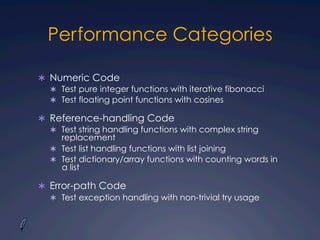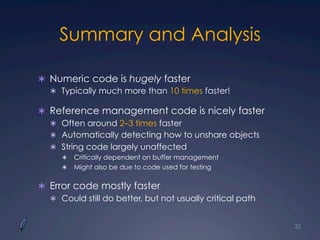The TclQuadcode Compiler
- 1. The TclQuadcode Compiler Status report on Tcl type analysis and code generation Donal Fellowsorcid.org/0000-0002-9091-5938 Kevin Kenny
- 2. What is going on? Ü Want to Make Tcl Faster Ü Everyone benefits Ü Lehenbauer Challenges Ü 2 times faster (“Perl” territory) Ü Better algorithms Ü Better buffer management Ü Bytecode optimization Ü 10 times faster (“C” territory) Ü Needs more radical approach 2
- 3. Generating Native Code is Hard Ü Going to 10 times faster requires native code Ü Bytecode work simply won’t do it Ü But Tcl is a very dynamic language Ü Even ignoring command renaming tricks Ü Native code needs types Ü Many platforms 3
- 4. Let’s Go to LLVM! Ü Solves many problems Ü Optimization Ü Native code issuing Ü Runtime loading Ü LLVM Intermediate Representation (IR) Ü Effectively a virtual assembly language target Ü Existing Tcl package! Ü llvmtcl by Jos Decoster Ü Introduces problems though Ü LLVM’s idea of “throw an error” is to panic with a gnostic error message 4
- 5. How to get to LLVM? Ü Still need those pesky types Ü Still need fixed semantics Ü We need a new bytecode! Quadcode Ü Designed to help: Ü Simple translation from Tcl bytecode Ü More amenable to analysis 5
- 6. 6
- 8. Quadcode Ü Based on three-address code assembly Ü The Tcl code: set a [expr { $b + 1 }] Ü Equivalent Tcl bytecode: loadScalar %b; push “1”; add; storeScalar %a Ü Equivalent (optimized) quadcode: add {var a} {var b} {literal 1} Ü No stack Ü Temporary variables used as required 8
- 9. Example: Tcl code to bytecode proc cos {x {n 16}} { set x [expr {double($x)}] set n [expr {int($n)}] set j 0 set s 1.0 set t 1.0 set i 0 while {[incr i] < $n} { set t [expr { -$t*$x*$x / [incr j] / [incr j] }] set s [expr {$s + $t}] } return $s } ... 29: startCommand {pc 42} 1 38: push1 {literal 0} 40: storeScalar1 {scalar j} 42: pop 43: startCommand {pc 56} 1 52: push1 {literal 1.0} 54: storeScalar1 {scalar s} 56: pop 57: startCommand {pc 70} 1 66: push1 {literal 1.0} 68: storeScalar1 {scalar t} 70: pop 71: startCommand {pc 84} 1 80: push1 {literal 0} 82: storeScalar1 {scalar i} 84: pop 85: startCommand {pc 179} 1 94: jump1 {pc 160} 96: startCommand {pc 142} 2 105: loadScalar1 {scalar t} 107: uminus 108: loadScalar1 {{scalar arg} x} 110: mult 111: loadScalar1 {{scalar arg} x} 113: mult 114: startCommand {pc 126} 1 123: incrScalar1Imm {scalar j} 1 126: div 127: startCommand {pc 139} 1 136: incrScalar1Imm {scalar j} 1 139: div 140: storeScalar1 {scalar t} 142: pop ... 9
- 10. Example: bytecode to quadcode 29: startCommand {pc 42} 1 38: push1 {literal 0} 40: storeScalar1 {scalar j} 42: pop 43: startCommand {pc 56} 1 52: push1 {literal 1.0} 54: storeScalar1 {scalar s} 56: pop 57: startCommand {pc 70} 1 66: push1 {literal 1.0} 68: storeScalar1 {scalar t} 70: pop 71: startCommand {pc 84} 1 80: push1 {literal 0} 82: storeScalar1 {scalar i} 84: pop 85: startCommand {pc 179} 1 94: jump1 {pc 160} 96: startCommand {pc 142} 2 105: loadScalar1 {scalar t} 107: uminus 108: loadScalar1 {{scalar arg} x} 110: mult 111: loadScalar1 {{scalar arg} x} 113: mult 114: startCommand {pc 126} 1 123: incrScalar1Imm {scalar j} 1 126: div 127: startCommand {pc 139} 1 136: incrScalar1Imm {scalar j} 1 139: div 140: storeScalar1 {scalar t} 142: pop 11: copy {temp 0} {literal 0} 12: copy {var j} {temp 0} 13: copy {temp 0} {literal 1.0} 14: copy {var s} {temp 0} 15: copy {temp 0} {literal 1.0} 16: copy {var t} {temp 0} 17: copy {temp 0} {literal 0} 18: copy {var i} {temp 0} 19: jump {pc 37} 20: copy {temp 0} {var t} 21: uminus {temp 0} {temp 0} 22: copy {temp 1} {var x} 23: mult {temp 0} {temp 0} {temp 1} 24: copy {temp 1} {var x} 25: mult {temp 0} {temp 0} {temp 1} 26: add {var j} {var j} {literal 1} 27: copy {temp 1} {var j} 28: div {temp 0} {temp 0} {temp 1} 29: add {var j} {var j} {literal 1} 30: copy {temp 1} {var j} 31: div {temp 0} {temp 0} {temp 1} 32: copy {var t} {temp 0} 10
- 11. Quadcode Analysis Ü Code is converted to Static Single Assignment (SSA) form Ü Variables assigned only once Ü Phi (φ) instructions used to merge variables at convergences (after if-branches and in loops) Ü Lifetime analysis Ü Corresponds to where to use Tcl_DecrRefCount Ü Type analysis Ü What type of data actually goes in a variable? 11
- 12. Example: Tcl code to cleaned-up quadcode proc cos {x {n 16}} { set x [expr {double($x)}] set n [expr {int($n)}] set j 0 set s 1.0 set t 1.0 set i 0 while {[incr i] < $n} { set t [expr { -$t*$x*$x / [incr j] / [incr j] }] set s [expr {$s + $t}] } return $s } 0: param {var x} {arg 0} 1: param {var n} {arg 1} 2: invoke {var x} {literal tcl::mathfunc::double} {var x} 3: invoke {var n} {literal tcl::mathfunc::int} {var n} 4: copy {var j} {literal 0} 5: copy {var s} {literal 1.0} 6: copy {var t} {literal 1.0} 7: copy {var i} {literal 0} 8: jump {pc 18} 9: uminus {temp 0} {var t} 10: mult {temp 0} {temp 0} {var x} 11: mult {temp 0} {temp 0} {var x} 12: add {var j} {var j} {literal 1} 13: div {temp 0} {temp 0} {var j} 14: add {var j} {var j} {literal 1} 15: div {temp 0} {temp 0} {var j} 16: copy {var t} {temp 0} 17: add {var s} {var s} {temp 0} 18: add {var i} {var i} {literal 1} 19: lt {temp 0} {var i} {var n} 20: jumpTrue {pc 9} {temp 0} 21: return {} {var s} 12 Note that this is before SSA analysis
- 13. Example: In SSA form 0: param {var x 0} {arg 0} 1: param {var n 1} {arg 1} 2: invoke {var x 2} {literal tcl::mathfunc::double} {var x 0} 3: invoke {var n 3} {literal tcl::mathfunc::int} {var n 1} 4: copy {var j 4} {literal 0} 5: copy {var s 5} {literal 1.0} 6: copy {var t 6} {literal 1.0} 7: copy {var i 7} {literal 0} 8: jump {pc 18} 9: uminus {temp 0 9} {var t 21} 10: mult {temp 0 10} {temp 0 9} {var x 2} 11: mult {temp 0 11} {temp 0 10} {var x 2} 12: add {var j 12} {var j 19} {literal 1} 13: div {temp 0 13} {temp 0 11} {var j 12} 14: add {var j 14} {var j 12} {literal 1} 15: div {temp 0 15} {temp 0 13} {var j 14} 16: copy {var t 16} {temp 0 15} 17: add {var s 17} {var s 20} {temp 0 15} 18: confluence 19: phi {var j 19} {var j 4} {pc 8} {var j 14} {pc 17} 20: phi {var s 20} {var s 5} {pc 8} {var s 17} {pc 17} 21: phi {var t 21} {var t 6} {pc 8} {var t 16} {pc 17} 22: phi {var i 22} {var i 7} {pc 8} {var i 23} {pc 17} 23: add {var i 23} {var i 22} {literal 1} 24: lt {temp 0 24} {var i 23} {var n 3} 25: jumpTrue {pc 9} {temp 0 24} 26: return {} {var s 20} 13
- 14. The Types of Tcl Ü Tcl isn’t entirely typeless Ü Our values have types Ü String, Integer, Double- precision float, Boolean, List, Dictionary, etc. Ü But everything is a string Ü All other types are formally subtypes of string 14 string double integer booleannumeric bool int BOTTOM list dict
- 15. Example: Determined Types Ü Variable types inferred: Ü DOUBLE (i.e., proven to only ever contain a floating point number) Ü var x 0, var x 2,var t 8, var t 37, temp 0 16, … Ü INT (i.e., proven to only ever contain an integer of unknown width) Ü var n 1, var n 4, var j 10, var i 12, var j 35, var j 22, var j 26, … Ü INT BOOLEAN (i.e., proven to only ever contain the values 0 or 1) Ü var j 6, var i 9, temp 0 41, … Ü Return type inferred: Ü DOUBLE (i.e., always succeeds, always produces a floating point number) 15
- 16. Neat Tech along the Way Ü Uses TclBDD as Reasoning Engine Ü Datalog is clean way to express complex programs Ü Good for computing properties Ü Stops us from going mad! Ü (presented last year) Ü Might be possible to use quadcode itself as an bytecode-interpreted execution target Ü Totally not our aim, but it is quite a bit cleaner Ü Not yet studied 16
- 17. We’re at the Station… 17
- 19. Generating LLVM Ü LLVM Intermediate Representation (IR) is very concrete Ü Lower level than C Ü Virtual Assembler Ü Each Tcl procedure goes to two functions 1. Body of procedure 2. “Thunk” to connect body to Tcl Ü Each quadcode instruction goes to a non- branching sequence of IR opcodes Ü Keep pattern of basic blocks Ü Except branches, which branch of course
- 20. Compiling Instructions: Add Ü Adding two floats is trivial conversion %s = fadd double %phi_s, %tmp.08 Ü Adding two integers is not, as we don’t know the bit width Ü So call a helper function! %j = call %INT @tcl.add(%INT %phi_j, %INT %k) Ü The INT type is really a discriminated union 20
- 21. Compiling Instructions: Add Ü Many ways to add Ü Which to use in particular situation? Ü How we do it: Ü Look at the argument types (guaranteed known) Ü Look up TclOO method in code issuer to actually get how to issue code Ü Add the types to the method name Ü Unknown method handler generates normal typecasts Ü Just need to specify the “interesting” cases 21
- 22. Example: Issuing an Add Ü Want to issue an add: add {var a 1} {var b 2} {var c 3} Ü Look up argument types: {var b 2} à DOUBLE {var c 3} à INT Ü Call issuer method add(DOUBLE,INT) Ü Doesn’t exist, build from add(DOUBLE,DOUBLE) and typecaster Ü End up with required instructions, perhaps: %45 = call double @tcl.typecast.dbl(%INT %c.3) %a.1 = fadd double %b.2 %45 22 Internal Standard Library Function
- 23. The Internal Standard Library Ü Collection of Functions to be Inlined by LLVM Optimizer Ü Implement many more complex operations 23 ; casts from our structured INT to a double-precision float define hidden double @tcl.typecast.dbl(%INT %x) #0 { ; extract the fields %x.flag = extractvalue %INT %x, 0 %x.32 = extractvalue %INT %x, 1 %x.64 = extractvalue %INT %x, 2 ; determine what the 64-bit value is %is32bit = icmp eq i32 %x.flag, 0 %value32bit = sext i32 %x.32 to i64 %value = select i1 %is32bit, i64 %value32bit, i64 %x.64 ; perform the cast and return it %casted = sitofp i64 %value to double ret double %casted }
- 24. Optimization Ü A critical step of IR generation is to run the optimizer Ü Cleans up the code hugely Ü Inlines functions Ü Removes dead code paths Ü We have much of Tcl API annotated to help the optimizer understand it Ü Documents guarantees and assumptions 24
- 25. Example: Optimized COS body %6 = fmul double %phi_t64, %x %7 = fmul double %6, %x %tmp.04 = fsub double -0.000000e+00, %7 %8 = extractvalue %INT %phi_j62, 0 %9 = icmp eq i32 %8, 0 %10 = extractvalue %INT %phi_j62, 1 %11 = sext i32 %10 to i64 %12 = extractvalue %INT %phi_j62, 2 %x.6425.i43 = select i1 %9, i64 %11, i64 %12 %z.643.i44 = add i64 %x.6425.i43, 1 %cast = sitofp i64 %z.643.i44 to double %tmp.05 = fdiv double %tmp.04, %cast %z.643.i = add i64 %x.6425.i43, 2 %13 = insertvalue %INT { i32 1, i32 undef, i64 undef }, i64 %z.643.i, 2 %cast7 = sitofp i64 %z.643.i to double %tmp.08 = fdiv double %tmp.05, %cast7 %s = fadd double %phi_s63, %tmp.08 25
- 26. The Other Types Ü Lists and Dictionaries are treated as Strings Ü Mapped to a Tcl_Obj* reference Ü Lifetime management used to control reference counting efficiently Ü Failing operations become tagged derived types Ü Failures cause jump to exception handling code Ü The BOTTOM type only occurs in functions that cannot return Ü If they return, they do so by an error 26
- 27. Neat Tech along the Way Ü Closures Ü Callbacks which capture local variables Ü Locally-scoped Variables Ü Easy way to stop variables from one place spreading elsewhere Ü Prevented many nasty bugs Example from Standard Library Builder # Create local LLVM function: tcl.int.32 set f [$m local "tcl.int.32" int<-INT ReadNone] params x build { my condBr [my isInt32 $x] $x32 $x64 label x32: my ret [my int.32 $x] label x64: my ret [my cast(int) [my int.64 $x]] } # Make closure to create call to tcl.int.32 my closure getInt32 {arg {resultName ""}} { my call [$f ref] [list $arg] $resultName } 27
- 28. Heading Out… 28
- 29. FAST? So, is this thing
- 30. Performance Categories Ü Numeric Code Ü Test pure integer functions with iterative fibonacci Ü Test floating point functions with cosines Ü Reference-handling Code Ü Test string handling functions with complex string replacement Ü Test list handling functions with list joining Ü Test dictionary/array functions with counting words in a list Ü Error-path Code Ü Test exception handling with non-trivial try usage
- 31. Performance Category Test Time (µs) Acceleration (%) Target Reached?Uncompiled Compiled Numeric fib 12.15 0.4758 2453 ✓✓ Numeric cos 6.277 0.3936 1495 ✓✓ Reference replacing 1.233 0.8792 40 ✗ Reference listjoin 2.300 0.6946 231 ✓ Reference wordcount 18.67 5.660 230 ✓ Error errortester 13.73 4.999 175 ✓-ish 31 Looking Great!
- 32. Summary and Analysis Ü Numeric code is hugely faster Ü Typically much more than 10 times faster! Ü Reference management code is nicely faster Ü Often around 2–3 times faster Ü Automatically detecting how to unshare objects Ü String code largely unaffected Ü Critically dependent on buffer management Ü Might also be due to code used for testing Ü Error code mostly faster Ü Could still do better, but not usually critical path 32
- 33. Going Fast! 33
- 35. Where Next? Ü Finish filling out translation from bytecode Ü Unset Ü Introspection Ü Address slow speed of compilation Ü Resulting code is fast, but process to get to it… Ü How to integrate into Tcl? Ü When to compile? Ü When to cache? Ü How to use LLVM practically? Ü What extensions to Tcl’s C API are needed?
- 36. Advanced Compilation Ü Compilation between procedures Ü Can we use type info more extensively? Ü Access to global variables Ü Currently local-variable only Ü Traces, variable scopes, etc. Ü Other types of compileable things Ü Lambdas, methods, … 36
- 37. Longer-term Questions Ü What changes should we do in Tcl in light of this? Ü Already some ideas: Ü Change incr to support floats Ü Some way to annotate suggested types on arguments Ü If we bite the LLVM bullet, what other changes follow? Ü Need to link to C++ libraries to use LLVM Ü Implement official C++ API to Tcl? 37




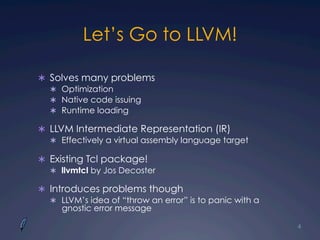



![Quadcode
Ü Based on three-address code assembly
Ü The Tcl code:
set
a
[expr
{
$b
+
1
}]
Ü Equivalent Tcl bytecode:
loadScalar
%b;
push
“1”;
add;
storeScalar
%a
Ü Equivalent (optimized) quadcode:
add
{var
a}
{var
b}
{literal
1}
Ü No stack
Ü Temporary variables used as required
8](https://image.slidesharecdn.com/tclquadcodepresentation-151022192044-lva1-app6891/85/The-TclQuadcode-Compiler-8-320.jpg)
![Example: Tcl code to bytecode
proc cos {x {n 16}} {
set x [expr {double($x)}]
set n [expr {int($n)}]
set j 0
set s 1.0
set t 1.0
set i 0
while {[incr i] < $n} {
set t [expr {
-$t*$x*$x / [incr j] / [incr j]
}]
set s [expr {$s + $t}]
}
return $s
}
...
29: startCommand {pc 42} 1
38: push1 {literal 0}
40: storeScalar1 {scalar j}
42: pop
43: startCommand {pc 56} 1
52: push1 {literal 1.0}
54: storeScalar1 {scalar s}
56: pop
57: startCommand {pc 70} 1
66: push1 {literal 1.0}
68: storeScalar1 {scalar t}
70: pop
71: startCommand {pc 84} 1
80: push1 {literal 0}
82: storeScalar1 {scalar i}
84: pop
85: startCommand {pc 179} 1
94: jump1 {pc 160}
96: startCommand {pc 142} 2
105: loadScalar1 {scalar t}
107: uminus
108: loadScalar1 {{scalar arg} x}
110: mult
111: loadScalar1 {{scalar arg} x}
113: mult
114: startCommand {pc 126} 1
123: incrScalar1Imm {scalar j} 1
126: div
127: startCommand {pc 139} 1
136: incrScalar1Imm {scalar j} 1
139: div
140: storeScalar1 {scalar t}
142: pop
...
9](https://image.slidesharecdn.com/tclquadcodepresentation-151022192044-lva1-app6891/85/The-TclQuadcode-Compiler-9-320.jpg)
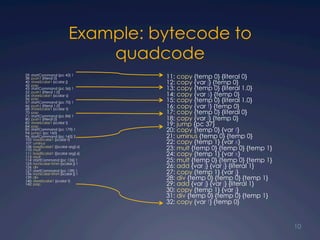

![Example: Tcl code to
cleaned-up quadcode
proc cos {x {n 16}} {
set x [expr {double($x)}]
set n [expr {int($n)}]
set j 0
set s 1.0
set t 1.0
set i 0
while {[incr i] < $n} {
set t [expr {
-$t*$x*$x / [incr j] / [incr j]
}]
set s [expr {$s + $t}]
}
return $s
}
0: param {var x} {arg 0}
1: param {var n} {arg 1}
2: invoke {var x} {literal tcl::mathfunc::double} {var x}
3: invoke {var n} {literal tcl::mathfunc::int} {var n}
4: copy {var j} {literal 0}
5: copy {var s} {literal 1.0}
6: copy {var t} {literal 1.0}
7: copy {var i} {literal 0}
8: jump {pc 18}
9: uminus {temp 0} {var t}
10: mult {temp 0} {temp 0} {var x}
11: mult {temp 0} {temp 0} {var x}
12: add {var j} {var j} {literal 1}
13: div {temp 0} {temp 0} {var j}
14: add {var j} {var j} {literal 1}
15: div {temp 0} {temp 0} {var j}
16: copy {var t} {temp 0}
17: add {var s} {var s} {temp 0}
18: add {var i} {var i} {literal 1}
19: lt {temp 0} {var i} {var n}
20: jumpTrue {pc 9} {temp 0}
21: return {} {var s}
12
Note that this is before SSA analysis](https://image.slidesharecdn.com/tclquadcodepresentation-151022192044-lva1-app6891/85/The-TclQuadcode-Compiler-12-320.jpg)



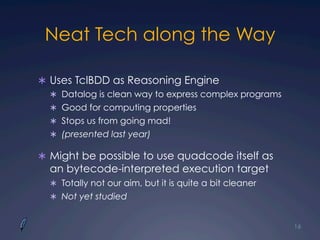




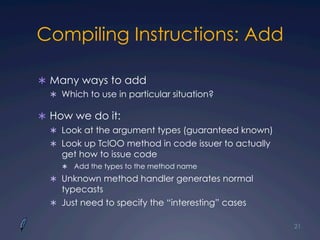

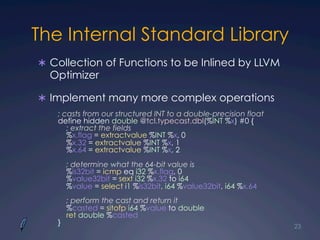
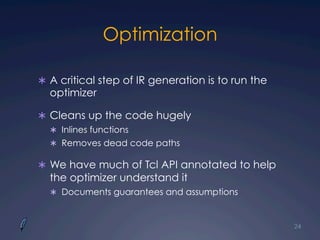


![Neat Tech along the Way
Ü Closures
Ü Callbacks which
capture local variables
Ü Locally-scoped
Variables
Ü Easy way to stop
variables from one
place spreading
elsewhere
Ü Prevented many nasty
bugs
Example from Standard Library Builder
# Create local LLVM function: tcl.int.32
set f [$m local "tcl.int.32" int<-INT ReadNone]
params x
build {
my condBr [my isInt32 $x] $x32 $x64
label x32:
my ret [my int.32 $x]
label x64:
my ret [my cast(int) [my int.64 $x]]
}
# Make closure to create call to tcl.int.32
my closure getInt32 {arg {resultName ""}} {
my call [$f ref] [list $arg] $resultName
}
27](https://image.slidesharecdn.com/tclquadcodepresentation-151022192044-lva1-app6891/85/The-TclQuadcode-Compiler-27-320.jpg)


